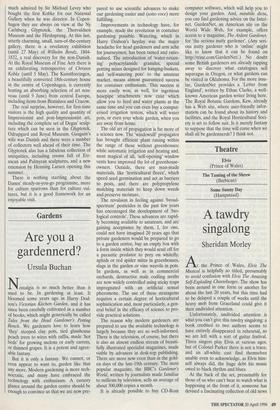Gardens
Are you a gardennerd?
Ursula Buchan
Nostalgia is so much better than it used to be. In gardening at least. It bloomed some years ago in Harry Dod- son's Victorian Kitchen Garden, and it has since been carefully cultivated in a number of books, which might generically be called Tales from the Head Gardener's Potting Bench. We gardeners love to learn how `they' steeped clay pots, tied glasshouse peach trees to wires with raffia, made 'hot beds' for growing melons or .early carrots, or thinned grapes. It is a potent and agree- able fantasy.
But it is only a fantasy. We cannot, or even appear to want to, garden like that any more. Modern gardening is more tech- nocratic, and many have embraced the technology with enthusiasm. A cursory glance around the garden centre should be enough to convince us that we are now pre- pared to use scientific advances to make our gardening easier and (sotto voce) more fulfilling.
Improvements in technology have, for example, made the revolution in container gardening possible. Watering, which in Harry Dodson's heyday was the major headache for head gardeners and arm ache for journeymen, has been tamed and ratio- nalised. The introduction of 'water-retain- ing' polyacrylamide granules, special potting mixes designed for hanging-baskets, and 'self-watering pots' to the amateur market, means almost guaranteed success for container enthusiasts. This success is more easily won, as well, for ingenious hosepipe attachments now exist which allow you to feed and water plants at the same time and you can even buy a comput- erised irrigation system, which will water pots, or even your whole garden, when you are away from home.
The old art of propagation is far more of a science now. The 'windowsill' propagator has brought efficient plant raising within the range of those without greenhouses; while automatic irrigation and heating and, most magical of all, 'self-opening' window vents have improved the lot of greenhouse- owners. Outside, there are man-made materials, like 'horticultural fleece', which speed seed germination and act as barriers to pests, and there are polypropylene mulching materials to keep down weeds . and preserve moisture.
The revulsion in feeling against 'broad- spectrum' pesticides in the past few years has encouraged the development of 'bio- logical controls'. These advances are rapid- ly becoming available to amateurs, and are gaining acceptance, by them. I, for one, could not have imagined 20 years ago that private gardeners would be prepared to go to a garden centre, buy an empty box with a form inside which they would send off for a parasitic predator to prey on whitefly, aphids or red spider mites in greenhouses, slugs in the garden or vine weevils in pots. In gardens, as well as in commercial orchards, destructive male codling moths are now widely controlled using sticky traps impregnated with an artificial sexual pheromone. The use of these stratagems requires a certain degree of horticultural sophistication and, most particularly, a gen- eral belief in the efficacy of science to pro- vide practical solutions.
The reason why modern gardeners are prepared to use the available technology is largely because they are so well-informed. There is the television, of course, but there is also an almost endless stream of beauti- fully illustrated specialist magazines, made viable by advances in desk-top publishing. There are more now even than in the gold- en days of the late-19th century. The most popular magazine, the BBC's Gardener's World, written by journalists made familiar to millions by television, sells an average of about 300,000 copies a month.
It is already possible to buy CD-Rom computer software, which will help you to design your garden. And, mirabile dictu, you can find gardening advice on the Inter- net. GardenNet, an American site on the World Wide Web, for example, offers access to a magazine, The Ardent Gardener, for 'the serious nutty gardener'. (Any seri- ous nutty gardener who is 'online' might like to know that it can be found on http://trine.com/GardenNet/.) No doubt some British gardeners are already tapping away to discover what catalogues sell asparagus in Oregon, or what gardens can be visited in Oklahoma. For the more insu- lar, GardenNet provides a 'Letter from England', written by Ed= Clarke, a well- known American garden writer living here. The Royal Botanic Gardens, Kew, already has a Web site, where user-friendly infor- mation can be found about its history and facilities, and the Royal Horticultural Soci- ety is set to follow suit. Is it merely fantasy to suppose that the time will come when we shall all be gardennerds? I think not.


































































 Previous page
Previous page